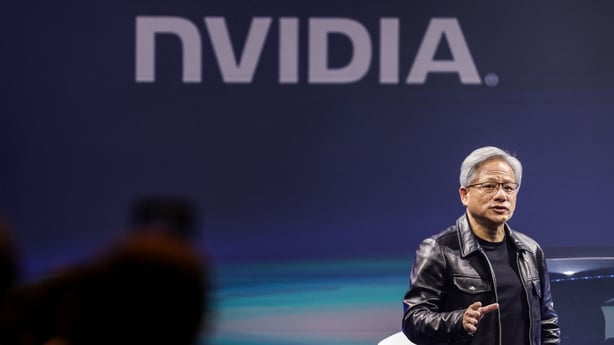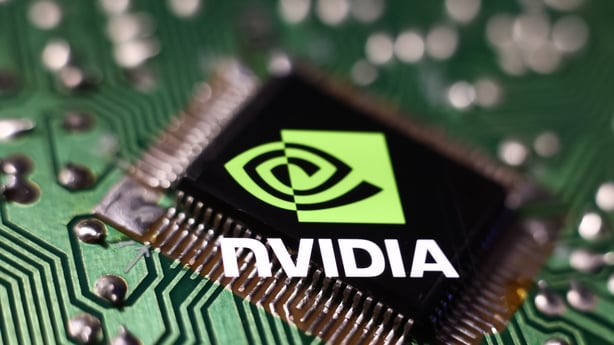Nvidia's stock climbed 1% today after the heavyweight chipmaker said its newest flagship AI processor is expected to begin shipping later this year.
Nvidia's stock reversed earlier losses and climbed to about $895 as Chief Executive Jensen Huang and Chief Financial Officer Colette Kress answered questions from investors at the company's annual developer conference in San Jose, California.
"We think we're going to come to market later this year," Kress said, referring to the company's new AI chip.
Some analysts said Wall Street has already factored in the debut of the B200 Blackwell chip, which the company claims is 30 times faster at some tasks than its predecessor.
The Blackwell chip will be priced between $30,000 and $40,000, Huang told CNBC.
"The Blackwell technology shows a significant performance uplift compared to Hopper (the current flagship chip) but it's always hard to live up to the hype," said David Wagner, portfolio manager at Aptus Capital Advisors, adding that investors were still digesting an 80% surge in Nvidia's stock so far this year.
Along with the Blackwell chip, which combines two squares of silicon the size of the company's previous offering, Nvidia detailed a new set of software tools on Monday, to help developers sell artificial intelligence models more easily to firms that use its technology.
On a hockey arena stage in the heart of Silicon Valley, Huang introduced Nvidia's latest chip, which is 30 times speedier at some tasks than its predecessor.
He also detailed a new set of software tools to help developers sell AI models more easily to companies that use technology from Nvidia, whose customers include most of the world's biggest technology firms.
Nvidia's chip and software announcements at GTC 2024 will help determine whether the company can maintain its 80% share of the market for AI chips.
"I hope you realise this is not a concert," Huang said, wearing his signature leather jacket and joking that the day's keynote would be full of dense math and science.
It was a nod to how Nvidia, once mostly known among computer gaming enthusiasts, has earned recognition on par with tech giants like Microsoft and has become a Wall Street standout, with sales that more than doubled in its most recent fiscal year to surpass $60 billion.

Nvidia's new flagship chip, called the B200, takes two squares of silicon the size of the company's previous offering and binds them together into a single component.
While the B200 "Blackwell" chip is 30 times speedier at tasks like serving up answers from chatbots, Huang did not give specific details about how well it performs when chewing through huge amounts data to train those chatbots - which is the kind of work that has powered most of Nvidia's soaring sales.
He also gave no price details.
Tom Plumb, CEO and portfolio manager at Plumb Funds, whose largest holdings include Nvidia, said the Blackwell chip was not a surprise.
"But it reinforces that this company is still at the cutting edge and the leader in all graphics processing. That doesn't mean the market is not going to be big enough for AMD and others to come in. But it shows that their lead is pretty insurmountable," said Plumb.
Nvidia said major customers including Amazon.com, Alphabet's Google, Microsoft, OpenAI and Oracle, are expected to use the new chip in cloud-computing services they sell, and also for their own AI offerings.
Nvidia also is shifting from selling single chips to selling total systems. Its latest iteration houses 72 of its AI chips and 36 central processors. It contains 600,000 parts in total and weighs 3,000 pounds (1,361 kg).
Many analysts expect Nvidia's market share to drop several percentage points in 2024 as new products from competitors come to market and Nvidia's largest customers make their own chips.

Though Nvidia is widely known for its hardware offerings, the company has built a significant battery of software products as well.
The new software tools, called microservices, improve system efficiency across a wide variety of uses, making it easier for a business to incorporate an AI model into its work, just as a good computer operating system can help apps work well.
In addition to AI software, Nvidia dived deeper into software for emulating the physical world with 3-D models.
For work on designing cars, jets and products, Huang also announced partnerships with design software companies Ansys, Cadence and Synopsys.
Shares of the three companies jumped around 3% in extended trade following Huang's comments.
Huang also said that Nvidia's software would be able to stream 3-D worlds to Apple's new Vision Pro headset.
Nvidia also introduced a new line of chips designed for cars with new capabilities to run chatbots inside the vehicle.
The company deepened its already-extensive relationships with Chinese automakers, saying that electric vehicle makers BYD and Xpeng will both use its new chips.
Toward the end of his keynote speech, Huang also outlined a new series of chips for creating humanoid robots, inviting several of the robots made using the chips to join him on the stage.

